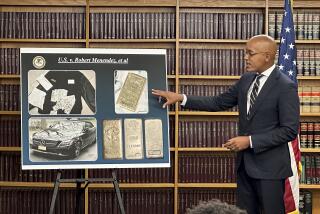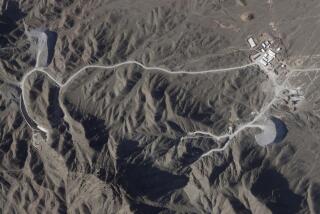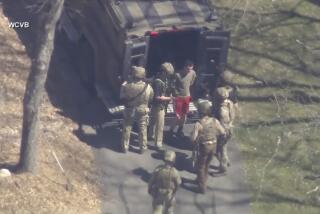U.S. Leaks Word of Secret Egyptian Chemical Warfare Plant; Cairo Issues Denial
WASHINGTON — In an attempt to force Egypt to publicly acknowledge the existence of a secret chemical warfare plant, some officials in the U.S. government alleged this week that Cairo had taken steps to advance its production capability of the deadly weapon, sources said Friday.
Although Egyptian President Hosni Mubarak issued a strong denial Friday that his nation had upgraded chemical weapons facilities, the allegation already has led to fallout between Cairo and Washington as well as among U.S. officials. There are fears of a new strain in relations with the close Middle East ally as a result of the disclosure, which surprised and angered some American officials.
U.S. sources confirmed that they believe Egypt has advanced its ability to produce nerve gas. But they said that they had hoped to keep the longstanding dialogue over the issue private.
Leak Called ‘Unfortunate’
One leading Bush Administration analyst on chemical warfare termed “unfortunate” the story leaked to the New York Times about a Swiss firm’s sales of the elements for a poison gas production plant to the Mubarak government. The report quoted Swiss officials as saying that the equipment probably would be installed in Abu Zaabal, a desert area north of Cairo.
The allegation appears in part linked to a disagreement within the Bush Administration over how to proceed with information about the company, Krebs A.G., initially provided by the Swiss government. Sources said that officials who leaked the story believe that action is warranted after months of fruitless discussions and that public exposure might prompt it.
“We don’t like the idea that anyone is building a big new chemical plant,” said an Administration specialist in chemical warfare. “But there are no legal reasons anyone can’t make it, just as long as they don’t use it, which is forbidden by an international treaty.
“In other words, there is little recourse except publicity and international pressure,” he said.
But other Administration officials said that they believe the United States will get better results by quietly discouraging any escalation. Indeed, some Bush Administration officials suggested that the United States in fact is not alarmed by Egypt’s replacement of obsolete facilities for production of a weapon that it has had for more than two decades.
In light of other Middle East nations’ growing capabilities for producing chemical weapons, such steps are “prudent defense planning” for Egypt, said one U.S. official.
“Egypt has adversaries and the government knows that Israel now has advanced capability in all three fields--nuclear, chemical and biological warfare. And next door is Libya, which has a new potential.
“Egypt has been into chemical weapons for 20 years. They have recently updated their capability with the help of West European firms. It is not surprising. So much of the equipment can still be found on the open market.”
Mubarak, who was visiting Brussels on Friday, said: “We are against chemical weapons. Of course, we do not build such a factory. We do not like the idea at all. We want to make peace, not war.”
In response to Egypt’s angry denial of a new weapons capability, the United States tried to calm ruffled diplomatic feathers while still underscoring its concern.
Issue Raised With Egypt
At the daily State Department press briefing, spokesman Charles Redman acknowledged that the chemical weapons issue “has been raised with Egypt. It is still a current issue.”
“We are opposed to the proliferation of all weapons of mass destruction, especially chemical, biological and nuclear weapons. Proliferation in areas of instability such as the Middle East is a particular concern. We have consistently urged all states in the region to forgo the development and acquisition of such weapons. In the case of Egypt, we consult frequently and closely on these kinds of subject.”
In Zurich, United Press International reported, a Swiss official said that Klaus Jacobi, state secretary of the Swiss Foreign Office, had sent a letter to Krebs A.G. demanding that the company sever its relationship with the project.
Krebs issued a statement saying it believed the parts that it shipped to Egypt would be used to produce pharmaceuticals. Krebs’ president, Hans Rudolf Weber, told the Associated Press on Friday that the company severed its business relationship with the Egyptian complex on advice of the Swiss government.
A Defense Ministry spokesman said the sales by the company were not illegal under Swiss law, but “they fell in a gray area . . . and the company complied with a request to end the relationship.”
Switzerland prohibits the sale of weapons to countries in zones of conflict or potential conflict, which includes regions sssuch as the Middle East and southern Africa.
More to Read
Sign up for Essential California
The most important California stories and recommendations in your inbox every morning.
You may occasionally receive promotional content from the Los Angeles Times.










